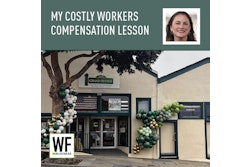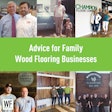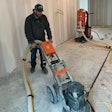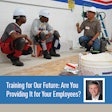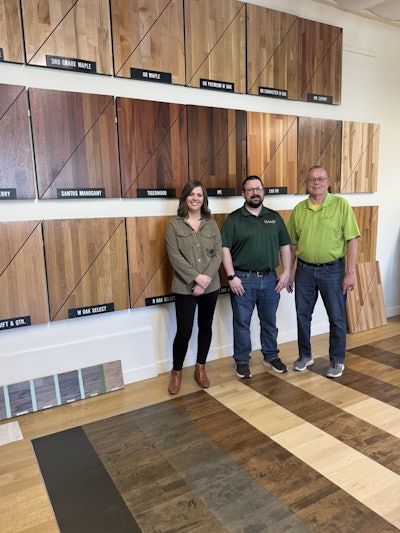
In 1980, my dad, Doug Lux, established Milwaukie, Ore.-based D-Lux Hardwood Floors. Over the past 45 years, his dedication and craftsmanship have shaped the company into a trusted name, specializing in custom milling, installation, repairs, refinishing, staining and finishing. The business has always been an integral part of my life and my brother Nick’s, and we’ve known from a young age that we wanted to carry on the family legacy. Nick first joined D-Lux Hardwood Floors as a summer job, working as an installer and floor technician, but what started as temporary work soon turned into a career spanning nearly 20 years. I began part-time in the office, handling administrative tasks while studying art, graphic design and business in college. When our dad decided to retire, Nick and I took on greater leadership roles to transition the business into new family management. Based on our family’s experience, here are some practical tips for transitioning a business to family ownership.
Start Planning Early
We started planning the transition about five years ago when we started working with a business consultant, and that was one of the best moves we made. Owning a business requires a unique level of commitment, and through the guidance of our consultant, we were able to navigate challenges effectively. We had to assess financial readiness, create clear leadership roles and ensure a seamless operational handoff. Starting early and relying on expert guidance made all the difference in ensuring a smooth and well-prepared transition to family ownership.

Define Roles Clearly
Throughout this period, we held weekly meetings, each focused on a different goal. One key goal was developing an “As Is” organizational chart, detailing each employee and their respective roles and responsibilities. This gave us a clear understanding of the existing structure and where adjustments were needed. We then created a “Desired Future” organizational chart, outlining a transition where our dad shifted to a part-time advisory role, with his duties redistributed accordingly. Utilizing his technical background, Nick handles sales and estimating, while I use my business and arts background to handle the accounting and marketing side of things. To assess our progress, we implemented a rating scale—practicing, competent and trusted— helping us evaluate how effectively we were fulfilling each responsibility. If someone was marked as “practicing,” we knew they needed more experience in that area, whereas “trusted” indicated they had proven their ability to handle their responsibilities confidently.
Open Communication
Working with others can be difficult, especially if it’s with family members, but we’ve found that regular communication makes all the difference. We have weekly meetings to help ensure that we are all on the same page, giving us a space to address concerns, set goals and keep things running smoothly.
Legal and Financial Planning
Partnering with a CPA has been invaluable throughout the ownership transition and for the overall success of the business. From the very beginning, our CPA took the time to meet with me and Nick, walking us through the complexities of business ownership, from financial planning to tax strategies and growth opportunities. Their expertise helped us understand the numbers beyond day-to-day operations, allowing us to plan for future growth. They shared insights into the challenges and advantages, helping us make informed decisions and avoid common pitfalls. They also guided us in structuring our financial statements to ensure we had a clear picture of cash flow, profitability and tax liabilities.
We also collaborated closely with our attorney to ensure the transition was handled properly from a legal standpoint. They helped us navigate contract revisions, ownership agreements and liability protections, ensuring that all paperwork aligned with state regulations and business succession laws.
Throughout the process, we learned that having specialized advisors, including a CPA and an attorney, provided essential guidance in areas we hadn’t considered before.
 D-Lux Hardwood Floors' showroom in Milwaukie, Ore.Courtesy of D-Lux Hardwood Floors
D-Lux Hardwood Floors' showroom in Milwaukie, Ore.Courtesy of D-Lux Hardwood Floors
Prepare for Leadership
With more than 40 years of experience, our dad has been an outstanding mentor, always ready to answer our questions and provide guidance. Whether it was walking us through complex installation techniques, sharing lessons learned from past challenges, or simply reminding us of the importance of craftsmanship, his support has been invaluable. His approach has also helped our employees adjust smoothly, and having him as a resource during this shift has created a sense of stability for the team. Beyond technical and business expertise, our dad has also taught us the value of relationships—whether it’s maintaining strong client connections, treating employees with respect or fostering a positive workplace culture. His leadership has shaped how we carry forward the family legacy. Even as he steps back, his presence remains an integral part of D-Lux Hardwood Floors, and we’re grateful for the foundation he has built for us to continue growing.
Embrace Change
At the end of the day, the transition to ownership, especially in a family business, isn’t for everyone, but these last few years have been a huge learning opportunity to get educated on what you don’t know within a business. Both my brother and I have grown up working in the business and were familiar with how the business operates, but with the ever-changing business climate, it is important to adapt and change with the times to stay relevant. The transition can be a mix of emotions, but at the end of the day, if you are on the same page with your business partners, you can grow and expand how you see fit. Most importantly, we have a common goal: to keep our family business thriving for years to come.
















